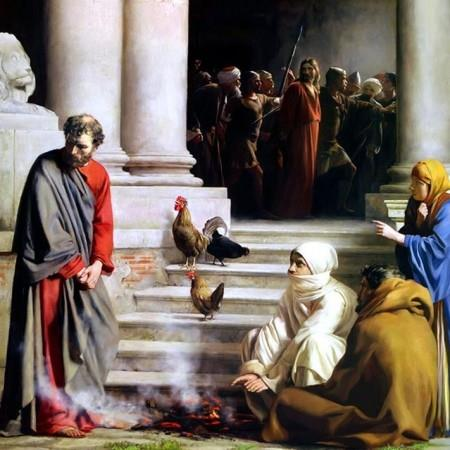Luke 22
Who is the greatest?
Luke 22
24 And there was also a strife among them, which of them should be thought greatest.
25 And He said to them, The kings of the nations have lordship over them, and they
who have authority over them are called benefactors1.
26 But you shall not be so; but he who is greater among you, let him become as the
younger, and he who governs as he who ministers.
27 For which is greater, he who sits, or he who ministers? Is it not he who sits? But I am
in the midst of you as He who ministers.
28 But you are they who have remained with Me in My temptations.
29 And I set up for you a kingdom, as My Father has set it up for Me,
30 that you may eat and drink at My table in My kingdom, and sit on thrones, judging
the twelve tribes of Israel.
AC 3441. For the sake of Abraham my servant. That this signifies from the Lord’s Divine Human is evident from the representation of Abraham, as being the Lord’s Divine, and also the Divine Human... and from the signification of “my servant,” when said of the Lord, as being the Divine Human—not that the Divine Human is a servant, because this also is Jehovah... but because the Lord by [His Divine Human] serves the human race. For by this man is saved, inasmuch as unless the Lord had united the Human to the Divine, so that man might be enabled with his mind to look upon and adore the Human of the Lord and thus have access to the Divine, he could not possibly have been saved. The conjunction of man with the Divine itself, which is called the “Father,” is through the Divine Human, which is called the “Son.” Thus it is through the Lord, by whom the spiritual man understands the Human, but the celestial man the Divine Itself. Hence it is evident why the Divine Human is called a “servant,” namely, because it serves the Divine, in order that man may have access to it, and because it serves mankind for their salvation.
AC 3441:4. ...Truth itself also is relatively a servant... And because it is so, the Lord Himself calls Himself one who... “ministers” ....
AC 3857:5e. If anyone had told the men of the Jewish Church that their rituals derived their holiness from the Divine things of the Lord that were in them, they would not have acknowledged it at all.
AC 3857:6. Such also was man when the Lord came into the world, and still more corporeal had he become, and especially those who belonged to the church. This is very plain from the disciples themselves, who were continually with the Lord, and heard so many things concerning His kingdom, and yet were not able to perceive interior truths, not being able to form any other notion of the Lord than such as the Jews at this day entertain concerning the Messiah whom they expect; namely, that He will exalt their people to dominion and glory above all the nations in the universe. And even after they had heard so many things from the Lord respecting the heavenly kingdom, they still could not think otherwise than that the heavenly kingdom would be like an earthly kingdom, and that God the Father would be the highest in it, and after Him the Son, and then the twelve, and thus that they would reign in their order.... For this reason also the Lord, after He had taught them what it was to be the greatest in heaven (Matt. 20:25-28; Mark 10:42-45), still spoke according to their apprehension, saying that they should sit on twelve thrones and judge the twelve tribes of Israel (Luke 22:24, 30...).
AC 3857:7. If they had been told that by “the disciples” are not meant themselves, but all who are in the good of love and faith... also that in the Lord’s kingdom there are neither thrones, sovereignties, nor rule, as in the world, and that they could not even judge the least thing in a single man... they would have rejected the saying, and, leaving the Lord, would have returned everyone to his own occupation. The reason why the Lord so spoke was that they might receive external truths, and thereby be introduced into internal ones, for within those external truths which the Lord spoke, internal truths were concealed, which in course of time stand open; and when these stand open, the external truths are dissipated and serve only as objects or means of thinking about the internal truths.
1 Literally, “those who do good works”
Questions and Comments
- Why does the Lord call Himself “one who ministers,” considering that He is the Lord of the universe?
- If we had been among the twelve disciples, would we have realized who He really is, and what kind of kingdom He rules?
- How does the way the Lord spoke to the disciples—both teaching them the truth, and also accommodating to their state—set us an example in how we speak to children and to each other?
- In what sense can we be servants of the Lord, considering that we can do nothing good from ourselves?
| previous |  |
next |
|---|


